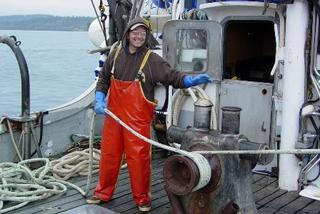NIOSH Takes On Injuries in the Fishing Fleet

Tuesday, January 28 2014
For more than 20 years, NIOSH has been working to prevent accidental deaths in the fishing industry. Now, these safety experts are tackling injuries -- the kind fishermen are used to getting every season.
As KUCB's Lauren Rosenthal reports, that might make this a tougher problem to solve.
In her time at the National Institute for Occupational Safety and Health, Jennifer Lincoln says she’s found a common cause behind the most serious fishing accidents.
Lincoln: "If you ask me what leads to fatalities in the fishing industry, it's drowning. It's vessel losses and falls overboard."
Lincoln directs the Alaska field office for NIOSH.
Their commercial fishing experts have been studying fatal accidents since 1991. Using their research, they’ve come up with a slew of mechanical gadgets -- like door monitors and emergency winch stops -- to make boats safer.
But Lincoln says it’s not clear if there’s a button or sensor out there that can keep fishermen from getting hurt.
Lincoln: "What we don’t know -- what we don’t have as much information about -- are non-fatal injuries."
Injuries aren’t tracked like fatalities -- in part, because they are so common. But getting hurt can have big implications for a fisherman, like lost time and wages. If a problem goes untreated at sea for too long, it can lead to more serious ailments.
And that can be painful. Jake Jacobsen has fished in the crab fleet. He can rattle off some gruesome accidents.
Jacobsen: "I know guys that have had their foot smashed and bones broken when we were fishing way out west in the Aleutians, and they just stayed on the boat and wrapped it in a plastic bag, and ran the crane until they get to town and have a doctor look at it."
Unalaska’s clinic sees a lot of those patients. That’s why Lincoln, from NIOSH, teamed up with a state epidemiologist to study the local patient load.
Lincoln says they looked through the Unalaska clinic’s medical charts from 2007 to 2008.
Lincoln: "What was interesting to me is that, in that two-year time period, a fisherman came in every other day to the clinic to be treated for a traumatic injury."
Most of the time, that was a sprain or contusion. It usually happened while they were catching fish or processing it.
Lincoln: "They were hit by something, or struck by something, or crushed by something."
That could be fishing gear, or even a box of frozen fish stored aboard a processing vessel.
Those are pretty basic observations. Lincoln says there are some useful takeaways:
Lincoln: "Sometimes there’s a lot of time that goes by before they’re seen at the clinic. So the people on the vessel need to be properly trained in managing the injury."
Lincoln is sharing these results with safety officers at fishing companies. Eventually, she wants to be to find the patterns in how fishermen get injured.
That would require a bigger pool of data, which Lincoln says NIOSH can get by teaming up with the state Fishermen’s Fund and the Coast Guard. Once they figure out the underlying causes, NIOSH can start suggesting tools to cut down on accidents.
But they’re never going to be able to eliminate them, says Jake Jacobsen.
He started out as a fisherman and now oversees about 80 crab boats in the Inter-Cooperative Exchange. Jacobsen says ending the derby-style fishery made crabbing safer. But still:
Jacobsen: "You knocked around a bit out there, out on deck."
That leads to lots of small injuries. When accidents happen:
Jacobsen: "If they’re little things, fishermen are kind of disinclined to talk about it anyways. You get over it."
And even if you can cut down on the risk of accidents, it’s a lot harder to change the culture of fishing -- the expectation of long hours, big payoffs, and the battle scars to show for it.
Stephanie Joyce contributed to this story from Seattle.




Keith Crumpton on Monday, February 10 2014:
I am in a similar wage structure in wild land fire which drives the problem like most of our problems in the USA at this juncture of history. The pay is either mediocre and if the incentive is more hours in bad environmental conditions then there's an historical precedent superseding all knowledge,laws, in the form of male passage rites at the beginning of your cultural indoctrination culminating in your powerlessness to have an education, a say in your government over the tyrannical market force that is freedom to be victimized and celebrated ad infinitum,ad nauseum.